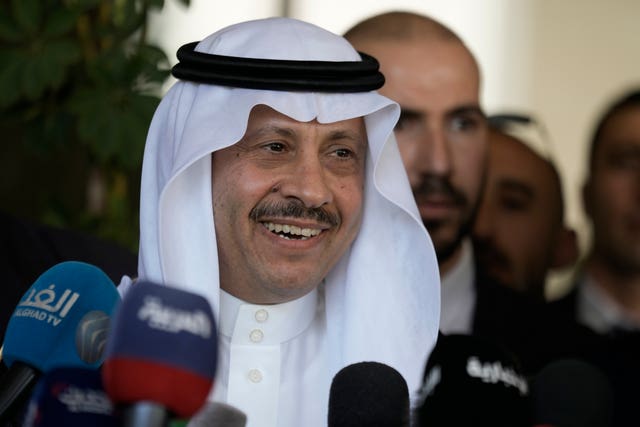Saudi Arabia’s newly appointed envoy visits Palestinian territories
The trip is linked to US efforts to normalise ties between Saudi Arabia and Israel.

Saudi Arabia’s newly appointed envoy to the Palestinian Authority visited the Israeli-occupied West Bank for the first time to present his credentials and talk to Palestinian officials on Tuesday.
The trip is linked to US efforts to normalise ties between Saudi Arabia and Israel.
The visit by Nayef al-Sudairi, who also serves as the Saudi ambassador to Jordan, is widely seen as an attempt by the kingdom to address the key sticking point in the Saudi-Israeli normalisation deal: the Palestinians.
The Saudi government has said it will normalise ties with Israel only if there is major progress toward the creation of a Palestinian state.

If the Biden administration can forge an agreement between Israel’s far-right, ultranationalist government and the Palestinian Authority, the Saudis stand to gain a defence pact with the US and US aid for a Saudi civilian nuclear programme.
Mr Al-Sudairi was appointed last month and is on his first visit to Ramallah, the seat of President Mahmoud Abbas’ Palestinian Authority in the West Bank.
During his two-day trip, the Saudi diplomat planned to meet Mr Abbas and other senior Palestinian officials. Top of the agenda is Saudi Arabia’s possible diplomatic ties with Israel and the relationship between the kingdom and the Palestinians, officials said.
Mr Al-Sudairi told senior Palestinian officials on Tuesday that Saudi Arabia supported the creation of a Palestinian state with East Jerusalem as its capital, according to a statement from Palestinian officials.
He praised efforts to bring about peace in the region in accordance with the Arab Peace Initiative.
Palestinian Foreign Affairs Minister Riyad al-Maliki called the meeting a “historical milestone to enhance and develop bilateral relations between the two sister countries and open up further prospects for cooperation in all fields”.
But it remained unclear what kind of Israeli concessions would be discussed in the Saudi-Palestinian talks. The deal depends on the willingness of Israel’s current government — whose Cabinet ministers have imposed sanctions on the Palestinian Authority and called openly for the annexation of the West Bank — to offer the concessions.
The Palestinian Authority also has not specified what it is willing to accept from the Israeli government. Mr Abbas said at the United Nations General Assembly in New York last week that there can be no peace in the Middle East without his people enjoying their “full and legitimate national rights”.
Israeli Prime Minister Benjamin Netanyahu, meanwhile, said his focus was on normalising relations between Israel and other Arab states before seeking a solution to the Israel-Palestinian conflict. Israel opened diplomatic relations in 2020 with three Arab countries, including the United Arab Emirates and Bahrain in the Persian Gulf.
Those deals raised hopes that Saudi Arabia and other Arab states that have long refused to recognise Israel would make a similar move.





